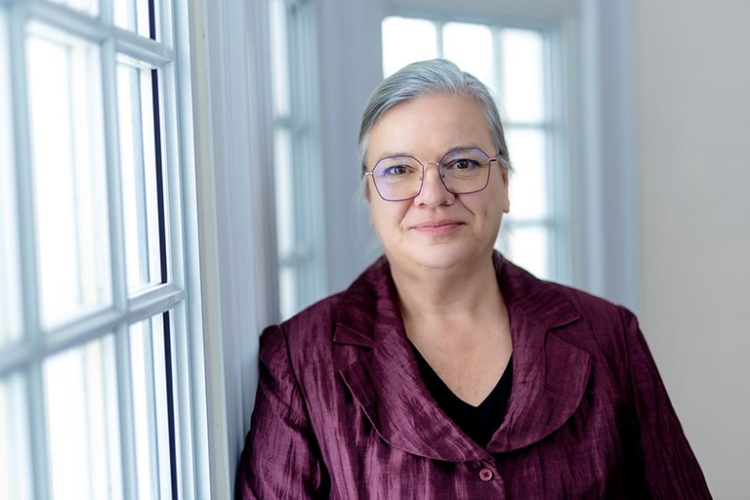After five years leading Concordia's Faculty of Arts and Science (FAS), Pascale Sicotte has been reappointed as dean by the university's Board of Governors. She will begin her second term on August 1, 2025.

In a recent conversation, Sicotte reflected on her journey, lessons learned during her first term, and her vision for the future of the FAS.
I want to help people develop and make an impact'
Who is Pascale Sicotte?
Pascale Sicotte: Two things that define me: I'm from Montreal, and I'm an anthropologist. For me, these elements are connected. Our city energizes us, but it also challenges us to better understand the world.
Through my leadership experiences at Concordia and the University of Calgary, I have developed a deep conviction that authentic relationships are fundamental to success. In a time marked by division and strife, the human dimension of our work genuine connection and empathy is essential to meaningful leadership.
I am passionate about creating spaces where everyone can thrive and contribute their best. This includes co-creating the initiatives that will define the present and future of FAS, ensuring they reflect our shared values and diverse perspectives.
Why did you choose the FAS at Concordia?
PS: After 25 years at the University of Calgary, and many years of field research studying primates in Rwanda and Ghana, I was ready for a new challenge. Leading a large faculty like Concordia's FAS immediately appealed because of our shared values engagement, collaboration and the clash of ideas,' inclusion, curiosity, creativity and innovation.
The FAS is a thriving ecosystem within a world of disciplines. We're broad in scope, globally engaged and accessible. And we're a leader in teaching and research across the fundamental and applied sciences, humanities and social sciences. This disciplinary richness fosters dialogue between different fields of knowledge and can play an essential role in developing critical thinking skills in our society.
As for Concordia, I was drawn to the university's inclusive spirit. This institution offers opportunities for everyone. Thanks to its diversity and its presence across two urban campuses, Concordia embodies the openness that Montreal and our society needs.
What are your takeaways from your first term?
PS: Institutional cultures can differ immensely. Transitioning not just between universities but from Alberta to Quebec meant navigating new cultural, academic and administrative contexts. After five years, I have built trusting relationships and developed a stronger understanding of the Faculty's identity, as well as the realities and ambitions of its members.
I want to help people develop and make an impact, and I've realized that listening is crucial. My colleagues bring creative and innovative ideas, tremendous energy and deep commitment. My role is sometimes to act as a catalyst, sometimes to connect people, and sometimes to support new ideas and approaches. For example, we've worked closely with our Advancement team to align donor support with our researchers' existing priorities and momentum helping meaningful work move forward, rather than asking researchers to reshape their projects to fit external expectations.
We've also been involved in developing the new Minor in Black and African Diaspora Studies in the Canadian Context, an outcome of the President's Task Force on Anti-Black Racism. It's an interdisciplinary program that joins the humanities and social sciences to better understand Black lives, histories and cultures.
Initiatives like these are a clear expression of the values that drew me to Concordia and the FAS in the first place.
What are your ambitions for the coming years?
PS: Universities play a fundamental role in our world and to say that world is changing is an understatement. More than ever, we need a university like Concordia. However, we are currently facing a difficult budgetary context that forces us to rethink how we operate.
The FAS is the heart of Concordia. While external pressures are stronger than ever, we will focus and consolidate our core strengths to continue fulfilling our mission in a way that is meaningful and impactful.
In the last several years, FAS has welcomed outstanding new members in areas of strategic importance to the university: sustainability, biomanufacturing, immigration and integration, Indigenous scholarship, and scholars who carry out research on aging, social justice, health and well-being. Plus, we have been collaborating among faculty leadership to develop our "Five Commitments," which reflect our shared values and guide our daily work. These commitments are meant to support without limiting our core mission of teaching, research and community engagement.
I believe that is what defines strong leadership: responding to an evolving world and surrounding yourself with the right people. By continuing to nurture strong internal connections and a shared sense of purpose, we can solidify our scholarly work and extend our impact beyond the university as thoughtful leaders, engaged citizens and partners in shaping a better world.
Discover the Faculty of Arts and Science's 5 Commitments.








